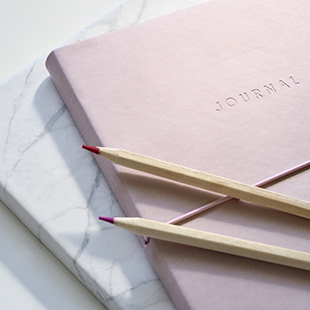Author: August Clarke
During elementary and middle school, the idea of keeping a “diary” is often accompanied with the visual of teenage girls huddled around a book where they transfer all their deepest, darkest secrets and gossip about their friends. In reality, while journals can be a great outlet for emotions, the act of journaling itself is not nearly so dramatic. In fact, journaling has been proven to have many positive effects on our health and peace of mind.
So, you may be wondering …
“How can journaling help me deal with my anxiety and depression?”
Mental health is a topic that continues to baffle many. The truth of the matter is that it is difficult for anyone to truly understand what those struggling with anxiety, depression, or other issues are really going through unless they themselves have experienced it. It is also important to note that everyone’s experience with mental health is unique and there is no one who understands it better than the person going through it him/herself.
When you are struggling internally, it is easy to coop yourself up in your room and disconnect from the people around you. Many people with depression (as one example) isolate themselves and have difficulty opening up to the people in their life.
It acts as a safe outlet for you to voice your thoughts and air emotions that you otherwise may be feel too vulnerable and afraid to do so with the people around you.”
This is why journaling is such a great activity to partake in. It acts as a safe outlet for you to voice your thoughts and air emotions that you otherwise may be feel too vulnerable and afraid to do so with the people around you. Writing is known to be a very cathartic activity that can assist in clearing your mind and allowing you a fresh perspective on what is going on in your life. Often, by laying out what is going on in your life all on the table, it will enable you to see your problems clearer. Writing things down forces you to acknowledge and work through your emotions: the good and the bad.
Journaling can also help you understand yourself better! What are your fears, insecurities, passions? After journaling regularly, you may just find that you understand yourself better than you did before. This is great, because the better you understand yourself, odds are the more effective you will be at identifying your triggers, outlining your comfort zone, and pinpointing strategies to help you move about life from day to day.
“But, August, what sort of things should I write about?”
The short answer? ANYTHING!
Your journal is yours. It is a safe space for you to transfer anything that is on your mind at any given moment without the fear of being judged for it – there are no limits for what you can put in it. You can write about anything from your daily routine to a funny joke you heard on the radio to your latest TV obsession and anything in-between. If you are an artsy person, consider turning your journal into a scrapbook or a safe place for all your poems you are too afraid to show your friends. Or, if you like to stay organized, you can use your journal to create checklists and bucket items.
Sometimes, we just need a place to rant and air out all the negative emotions that are weighing us down. That’s okay, too! Compartmentalizing can make us sick in the long run. Journaling gives you an opportunity to relieve yourself of all the thoughts that are holding you back.
If you have read all that and still don’t know where to start, my suggestion is to begin your journaling journey by creating a list of five things that make you happy. It could be anything from what you like about yourself to something you are grateful for. For some, this may be a challenging task – especially on a rough day – but even the most confident people feel down on themselves from time to time and there is not one person who would not benefit from this exercise.
In the end, whatever you choose to write about doesn’t matter! What is important is that you are making an effort to write something and understand yourself better.
























